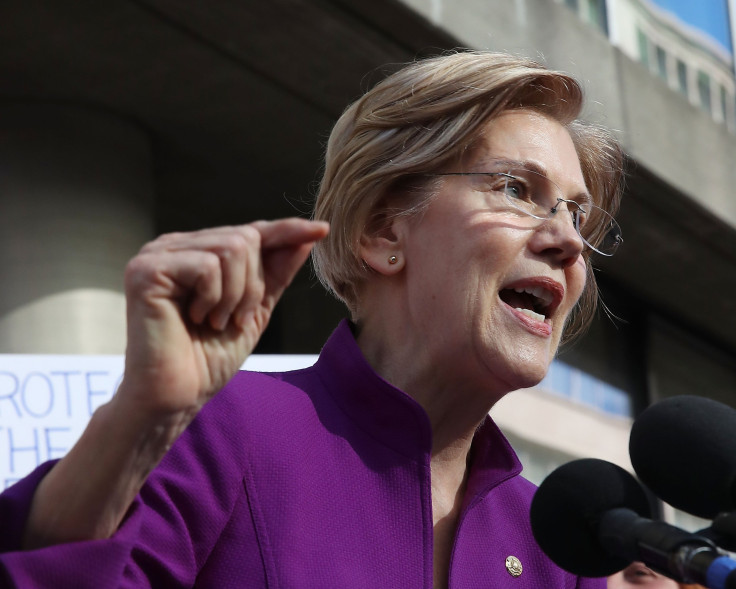Election 2020: Warren Unveils $2 Trillion 'Economic Patriotism' Campaign

Unveiling a campaign theme of “economic patriotism,” Sen. Elizabeth Warren of Massachusetts announced if president she would invest $2 trillion in climate-friendly industries over the next decade, create a cabinet-level Department of Economic Development and manipulate U.S. currency to promote exports and jobs, the New York Times reported Tuesday.
Warren’s pledge to intervene in markets is a strategy similar to what President Trump has attempted by levying tariffs on some of the nation’s largest trading partners, including China and Mexico. The U.S. maintains trade deficits with both countries, meaning our imports from them outstrip our exports to them. By making imported goods more expensive, Trump has sought to reduce these trade imbalances.
My administration will boost American workers—and I've already got a plan for that. We'll start with a new federal agency with one mission: Defend & create American jobs. That agency will use aggressive new tools to boost American workers, not Wall Street. https://t.co/pWxwPq2uV1
— Elizabeth Warren (@ewarren) June 4, 2019
The Massachusetts Senator’s approach is different. She’s calling for spending $2 trillion on environmentally sustainable research, manufacturing and exports to help “achieve the ambitious targets of the Green New Deal,” which combines renewable energy generation, virtually eliminates fossil fuel emissions, and includes a social justice component so the benefits of the transitioned economy are shared at all socioeconomic levels.
Warren’s proposal seems to be further evidence of her belief having well-considered policy positions help her to stand out in the 23-candidate Democratic primary race. Her campaign theme, “She’s got a plan for that,” results from what was initially perceived by supporters and critics alike as her “wonkiness.”
The Senator announced her plan in advance of campaign stops in Indiana and Michigan, two states hit hard by the export of manufacturing and other industrial sector jobs overseas. However, Warren still faces an uphill battle to the nomination. While her campaign appears to be gaining momentum, she remains third in polls behind Sen. Bernie Sanders, I-VT, and frontrunner Joe Biden, the former vice president in the Obama Administration.
NEW: Warren's got her own Green New Deal plan this AM, ahead of campaign stops in Michigan -- calling for a $2 trillion investment in environmentally friendly manufacturing. And that's just the opening volley in her "economic patriotism" approach. https://t.co/wHdIwgD8nK
— Elana Schor (@eschor) June 4, 2019
While Warren’s proposals are consistently in alignment with fellow progressive, Sanders, Biden’s positions have been more moderate, until as recently as today when he unveiled a $5 trillion climate plan that relied heavily on the “crucial framework” of the Green New Deal, championed by freshman Rep. Alexandria Ocasio-Cortez, D-N.Y.
“The climate crisis demands immediate and bold action,” Warren wrote, in a recent policy paper. “Like we have before, we should bank on American ingenuity and American workers to lead the global effort to face down this threat — and create more than a million good jobs here at home.”
Warren’s plan is a more ambitious outlay than former President Barack Obama’s $840 billion stimulus law in 2009 that earmarked $90 billion for so-called green jobs in the production and installation of energy efficient products.
Warren's plan is first in series of "economic patriotism" proposals the campaign is starting this week in Indiana and Michigan. Call for federal govt to further leverage power to make American companies keep jobs stateside. https://t.co/qLUfC0xtgR
— Steadman™ (@AsteadWesley) June 4, 2019
Like the major projects proposed by all Democratic presidential candidates, Warren’s initiatives rely on the rollback of GOP tax cuts passed in 2017, and likely additional tax increases on America’s richest corporations and individuals.
Warren’s proposal would establish a “Green Apollo Program,” creating a National Institute of Clean Energy, a “Green Industrial Mobilization,” pushing federal spending toward American-made renewable energy technologies, and a “Green Marshall Plan,” which would promote the export of the developed products.
Warren has argued on social media that blaming forces like globalization and automation for stagnant wages and growing inequality in the U.S. are “excuses” that fail to identify who she says are the real culprits: a greedy corporate America and corrupt political system.
© Copyright IBTimes 2025. All rights reserved.




















